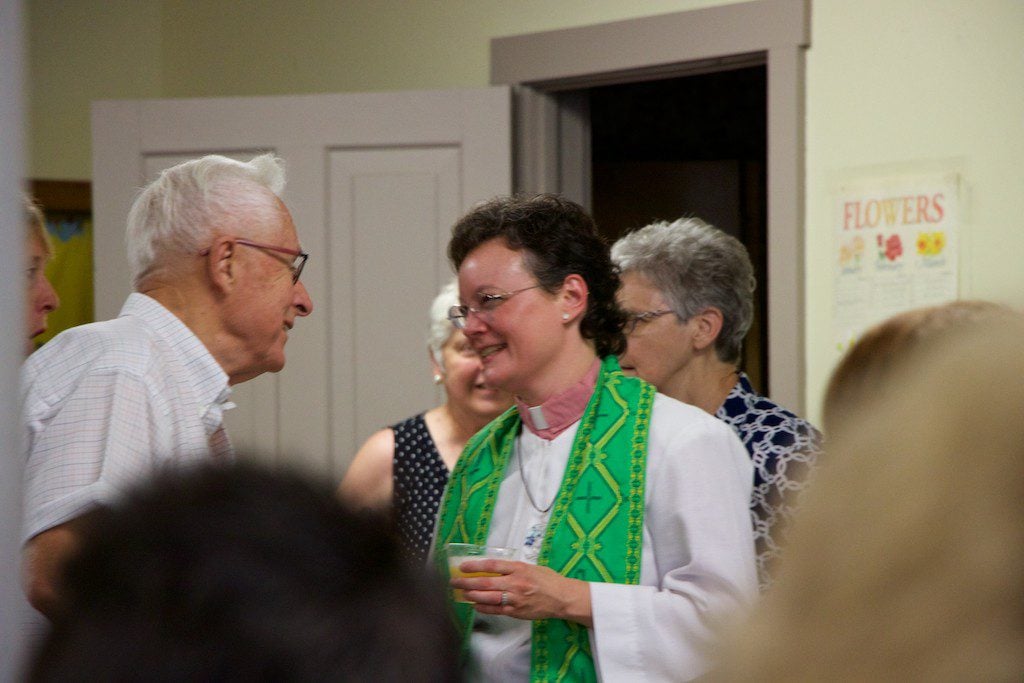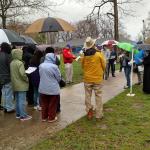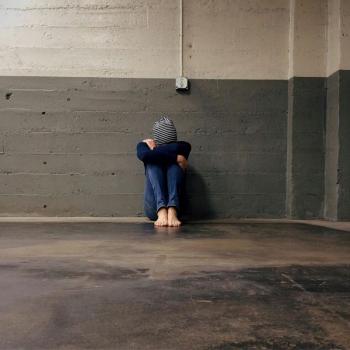Easter, April Fools. The last time it happened was in 1956. The next time it will happen will be in eleven years, in 2029. Easter is on the same date as April 1st, known as April Fool’s Day. The custom of playing jokes and engaging in merrymaking began with the ancient Romans, who had a typically set aside a day around the first day of spring, the vernal equinox. It was a day celebrating the change from the dark, cold days of winter to the frivolity and happiness of spring.
Some Christians may chafe at the notion of their holiest of days falling on the same occasion as April Fools Day.
But we may want to reconsider. Because celebrating Easter on April Fools is actually more appropriate than you may at first think.
“We are fools for Christ!” 1 Corinthians 4:10
In the early church, the Sunday after Easter was observed by the faithful as a day of joy and laughter with parties and shenanigans to celebrate Jesus’ resurrection. The custom of Bright Sunday, as it was called, came from the idea of some early church theologians that God played a joke on the devil by raising Jesus from the dead.

Easter was God’s supreme joke played on death — risus paschalis — “the Easter laugh!”
So on this Sunday after Easter, parishioners and pastors played practical jokes on each other, drenched each other with water, sang, and danced. It was a time for clergy and people to tell jokes and to have fun. [Looking for a fun song to sing in church on Holy Humor Sunday? Try: Holy Humor Sunday – Easter version of ‘Zippity Doo Dah’]
But once we entered the Victorian Era in the 1800’s, and then the 20th century with its Puritanism, the celebration of Jesus’ resurrection became sorely neglected. Let’s face it — laughing in church, with few exceptions, is not allowed! And we all learned that at a very early age. In my congregation growing up, you rarely heard laughter in the pews. Oh, occasionally the pastor would tell a mild joke during a sermon and there would be polite grins and quiet guffaws.
But as a rule, if you laughed in church, you got in trouble.
Just ask any of my siblings. We, like all kids, tended to get bored at some point during the service. And so we would do things to get the other person to laugh. We had to do quiet things, like draw little cartoons, or make silly faces. And if the other one giggled, my father would reach across the pew and twist our ear until our laughter ceased.
Of course as my father got older, he got as bad as the rest of us. He’d roll up little paper balls from the bulletin and pretend to flick them in the hair of some sweet little old lady in front of us. We’d all be stifling laughter. So my mom had to twist my dad’s ear.

You see, if there’s no outlet for the natural human tendency to want to have fun, and if the church takes itself too seriously, the humor has to come out in subversive ways. In the last few centuries, laughter was discouraged because it was thought to be the work of the devil and tended to undermine authority.
But laughter was created by God, for heaven’s sake!
Think of the very beginning of the Bible, Genesis Chapter One. God’s breath moved over the waters. What is laughter but a great burst of joyous air?
As Simon Jenkins, founder the of the group “Ship of Fools,” tells the story: “’In the beginning was the laugh… When God burst out laughing, there was light. When he burst out laughing the second time, the waters were born… At the seventh burst of laughter, the soul was born.”
Yes, but laughter is so irreverent, you may say. And besides, Jesus never laughed, right? Wrong!
Think about who Jesus hung around with. He hung out with salty fishermen, party-girls, and common ordinary people who needed to laugh just to make it through the drudgery of their days. And the religious people hated him for it. They said: “Here is a glutton and a drunkard, a friend of tax collectors and sinners” (Luke 7:34).

As Jenkins observes: “Now do you think it is possible that Jesus sat with these ordinary working people, eating their food, drinking their wine, listening to their stories and jokes, without ever laughing? That while the party was going on all around him, he was like this (unsmiling)? It is not possible. Jesus was very popular with these people. They loved him. And maybe it was Jesus laughing which was so scandalous to the religious leaders of his time.”
Also, think about this passage we heard from John 20, where Jesus breaths on his disciples. That is like the breath of God over the waters at creation. Only this is a new creation. And who says that breath was just a gentle “whoooooo”? It might have been an eruption of laughter! “Haaahahaha! Boy, did we fool death!”
We would do well to imitate Jesus’ sense of humor.
Jesus often uses humor in his parables and teachings, and in his actions, like riding a donkey into Jerusalem on Palm Sunday. It’s like Jesus is saying, “Don’t be so grim and prissy. Especially if you’re in a high position, don’t take yourself too seriously. Laugh it up a little.”
Laughter therapy helps to lower blood pressure and increase endorphins in the brain. If we laugh at ourselves when we’re out of sorts, it is so much better than taking it out on others, on ourselves, or on God. Having a sense of humor is a gift, because it puts things in perspective.”
I keep thinking of this scene from one of the Harry Potter books where one of the instructors gives the the young magicians a lesson on how to defeat “bogeys” or “bogarts”, which are ghosts that cleverly take on the form of whatever a person fears the most. One of the students, sees his most dreaded teacher, Professor Snape, a man who scares the poor boy speechless with his withering stare and demeaning words. But then the instructor tells him the secret to defeat the ghost. He has to think of of something funny. Pretty soon, the image of this dreaded Professor is acting like a silly fool. The students learn that the secret to overcoming your fears is to find something funny about them.

Laughter is one of the keys to defeating evil in the world.
Jenkins reminds us that “Jesus appears on earth to deliver God’s punchline. He comes to turn everything upside down. And upside down is as funny as an inside-out umbrella on a windy day, or a newspaper that goes out of control when you’re trying to turn to page 11 in a confined public space, or a man who accidentally wears his underwear outside his pants. Upside down, inside out, wrong way round… they’re all crazy and wrong and funny. But that’s how God is. God is full of surprises!”
On this April Fool’s Easter Sunday, we can celebrate that God has brought us laughter. God has rescued us from despair, ambushed us with joy.
That’s why so many churches have begun reviving this very old Christian custom of Holy Humor Sunday. Traditionally on the Sunday after Easter, worshipers are invited to come dressed in their brightest colors, in outlandish clothing with funny hats. Choirs show up wearing bathrobes and play kazoos. Clowns act as ushers and greet people at the doors. Church sanctuaries are decorated with streamers, smiley faces, and multicolored balloons emblazoned with messages like “Smile! God Loves You!” and “Christ is Risen! Smile!”
At some churches, they pass out percussion instruments – clickers, clackers, dingers, dongers, tooters, shakers, rattlers – and have everyone “make a joyful noise unto the Lord.” [And sing! Holy Humor Sunday – Easter version of ‘Zippity Doo Dah’]

And why not? Just look at how often words like “rejoice” and “gladness” are found in the Bible.
Acts, Chapter 2, “Therefore my heart was glad and my tongue rejoiced; moreover my flesh will live in hope . . . you will make me full of gladness with your presence.”
1 Peter, Chapter 1: “In this you rejoice . . . you believe in him and rejoice with an indescribable and glorious joy, for you are receiving the outcome of your faith, the salvation of your souls.”
So today, let the laughter lighten our spirits! As the Psalmist says, “Let us make a joyful noise unto the Lord!”
“Humor is, in fact, a prelude to faith; and laughter is the beginning of prayer.” — Reinhold Niebuhr
Sources:
“In the beginning was the laugh” Simon Jenkins, Co-founder of “Ship of Fools,” London; St Paul’s Episcopal Church, Akron, Ohio; Sunday 22 February 2004. Website: http://simonjenkins.com/websites/page/ship_of_fools
”The Fellowship of Merry Christians – Holy Humor Web Page” http://www.joyfulnoiseletter.com/hhsunday.asp

Leah D. Schade is the Assistant Professor of Preaching and Worship at Lexington Theological Seminary (Kentucky) and author of the book Creation-Crisis Preaching: Ecology, Theology, and the Pulpit (Chalice Press, 2015). She is an ordained minister in the Lutheran Church (ELCA).
Twitter: @LeahSchade
Facebook: https://www.facebook.com/LeahDSchade/.
Read also: Holy Humor Sunday – Easter version of ‘Zippity Doo Dah’













